Report made with the support of Intermón Oxfam
Refugees: how a war destroys a life
The blades on the fan Seif had at his side are stationary. It gives the sensation that they are paralyzed by the immense heat. In an overwhelm paradox feels like its stillness is increasing the stifling sensation. The more you look at it, the more this damn fan stays there unshakeable, with its orange petrified blades, unaware of the humid scorcher . It is like a provocation. Its owner explained: “It has been days ago since the cut of the electricity because I couldn’t pay for it, so we have it only from time to time now. It’s off at the moment. I’m sorry but I can’t turn it on.” Seif is drying the sweat of his face.
Before he posses s a useless fan, Seif Dabbur, Syrian, 49 years old, married with 3 children, had an air-conditioned house in Al Tadamu, a medium-classed residential neighborhood in the outskirts of Damascus. “Many nights here in this land I relive my own past live: here watching television on my sofa with my wife while my children are playing outside. Now I have to sleep on the floor. “ Seif is one of the millions of people that the Syrian war has destroyed his life. One of the millions who only a few months ago was sitting on his sofa watching television and now he lives in refugees camp fighting to obtain some sedatives tan can make him rest. “I decided to leave my house for a battle than took place in my neighborhood. They started shooting, launching missiles and destroying the whole neighborhood. They were saying the important is the war and not just one battle, but in reality the battles were much more important. If a battle takes place in your part of town you have to go and then remain homeless.” Seif ran away from his on some day last December at 5 a.m. “I was hearing the buzzing of the bullets. Days afterwards they told the whole building collapsed. ” He took with him his wife Rarj and his 3 children, Lulu – 7 years old, Mohamed and Hamoudi – 6 and 8 years old and big fans of Real Madrid. “If you ask them what they prefer, to eat or to watch a Real Madrid’s game, they would choose the game. Even though they have to stay hungry for the rest of the day.”, explained his father smiling. “Day by day they understand they can no more have what they had. When they ask me for money and I say no they express themselves by going around the flat saying that they are making me small arab springs”, and Seif was laughing again.
The whole family lives in ramshackle home in the palestinian refugee camp of Al Jalil, in the Lebanese region of Baalbek Valley, close to the Syrian border. They are descendants of Palestinians and all of their contacts recommended them to run away here. Almost nine months they have lived here. “There is no employmet here, I can’t afford anything anymore. Honestly, I am desperate”. When he got away from Damascus, the petrol company in which Seif was working offered him shelter in Zagreb. He told them “no”. “I thought it was going to be 2 or 3 weeks in the camp before going back home. Now I don’t have any.” The convulsed life change is leaving marks in my family: “My wife is crying every night, sometimes she makes herself look like she is sleeping just to hide her tears, but I know she is crying. She and my children go to psychiatrist. I must go too, but I don’t have enough money.” The only trouble of this petrol company ex-worker is the food. “You realize you can’t go without and almost all of our money goes in food ” And Seif is showing a pot with what will be their breakfast. Resuming: “Can you see this? This is our food for a day. In Syria I was giving this to Max”. Then he look up, waiting for a question.”Max was my dog”.
The Seif’s story is just one of the millions that could be told along the Syrian war and according to the UNHCR figures, mocking global awareness, there are 2 million refugees and 4.5 million displacements. Javier Espinosa tells us that all started on 16 of february 2011, when a group of Daraa students was infected with what was going on in Tunisia and Egypt. With an Arab Spring flag raised they went out on the streets and filled all of the city walls with paintings aiming a regime that to this date no one tried to bully. Directed by Basher Al Asad, the Arab Socialist Baath Party was imposing its iron key upon Syria since 1971. At that time was his father, Hafez, the one who was leading the destiny of the country. When he died in 2000, Basher inherit his father’s place, that does not even corresponded him (nor he was interested in) but he was someone who was pushed, by his older brother’s accidental death, into the hands of the government like a shy actor on stage. Then he proved he wasn’t that shy.
Since then Basher Al Asad started to lead the country with the invaluable Iran help, which was providing an economic and war support, and with the backing of Hezbollah, a Lebanese organization. Those three actors (Syrian regime, Iran and Hezbollah) are Shias and here is the pinnacle of all this macabre question. For many analysts the Syrian war is becoming a projection of an atavistic war designed to confront Shias and Sunies – the two main denominations of Islam in the middle East. What came like a social riot just to overthrow a dictatorship became an overflowing conflict for control upon the region.
From one end we can find Iran, the only country with major population of Shias. The Lebanese organization Hezbollah was Iran’s associate, Shias too, but this alliance wasn’t covering the whole Lebanon just because its citizens are mostly sunies or Christians. The same thing is happening in Syria, the third link in the Shias structure. The Asad regime is Alawis – one of the branches of the Shiism, but in the country is just a cultural fusion of religions and tribes mostly composed by Sunies. Confronting the Shias are the Sunies and that includes all of the countries in the region (Iraq, Jordan, Egypt) and counting with the help of Saudi Arabia and a powerful ally like United States (enemy of course of Iran). Supporting, how could it be otherwise, the Syrian rebels. This map reveals 2 sides: the Syrian regime fighting alongside the militiamen of Hezbula with arms from Iran; and from the other side the rebels with Saudi infrastructure and US support. With this grotesque summary we are getting closer to the complex puzzle of the Syrian war.
Probably those students from the first small rebellions in Daraa are not very interested in those geopolitical hieroglyphics. When they got arrested the real Syrian regime started to show its face: the students were locked up in prison with their hands broken. The word spread and more students went out on the streets. More and more people were pouring in until the movement, pacific at that time, spread along the rest country. Leaded by fear of what happened at the end in Libya and Egypt, Asad took the decision of stopping the demonstrations in a way that still impacts even now: by shooting the protesters. Thousands were killed in those few months in 2011 which led to a escalation of the tension to its peak on 27th of july when the Free Syrian Army was created. The protests were converted, from this day, into an armed resistance. That was the beginning of the civil war.
From that moment there was no bargaining in the regimen’s way of smashing the rebellion. It used all of its powers and crossed all of the red lines planted by the foreign countries. Thousands of people were assassinated both civilians and military. In spite of that rebels did not weaken. They took key positions in the major cities and converted a war into an enduring guerrilla. Alepo, Homs, Damascus…entire neighborhoods flatten, street protected by snipers, car bombs… The world chose to left them to sort everything like a neighborhood fight with pending accounts. And then right in the middle of this mess somehow Al Qaeda members managed to cross from the Iraq borderline. It was summer of 2012. Al Nursa was the main one, although there was more. Kurd Military forces from the north started to show themselves. United but not that rebellious they started pressuring Asad, but as the time passed this union weakened. The opposition has in its hindsight the overthrow of Asad, but that is the only thread that is keeping the whole fragile coexistence in which not a few are predicting a bloody post-ear era if they are victorious. In fact, in some points of the country there already are confrontations between Syrian rebels and Jihadists.
As of today, the confrontations between Asad’s regime and the rebellions are encysted on every major city all around the country and all of the fights are lasting for days, taking places on the streets that the next week are lost. It looks like the turning came with the use of chemical weapons by Asad and it was something that could lead to an intervention from United States.
For two million refugees that is good news, but they are mostly worried when they can finally get home. Between regime repression, Syrian rebels, military attacks they have had to leave everything and escape Syria at all cost. Almost no one knows when they can get home or how, because all of their houses are now ruined. If they decided to stay they will have the fortune of living in an area totally controlled by one of the sides which means fewer confrontations or if not they could have the bad luck to get in the middle of a fight and find their houses and neighborhoods destroyed. That is what’s happened to almost 4.2 million people, called the internal displacements. A total of 6 million Syrians out of their households, which converts this war into the biggest humanitarian crisis since when the world found out what was happening in Rwanda.
Half of a million refugees are now in Jordan a country that had installed camps to provide shelter for all of them. More than 700 000 took the option to go to Lebanon, where the government decides not to install camps to prevent disturbances like the one the suffered in 1948 with the Palestinians. The Lebanese executive communicated that he is regretting that decision, because now there are 300 000 Syrians war refugees settling in where they can. Both of those countries are limiting their border access due to an overflowing capacity. Although they deny limiting the border access the amount of refugees crossing has dropped drastically over the past 30 days. That is the main reason the Syrian are heading back to Iraq: 50 000 people have got in joining the 127 000 refugees already there. Turkey with almost 463 000 and Egypt 111 000 are the other two countries in which Syria is bleeding out. The rest (mostly wealthy families) are all around Europe and America. One million of those refugees are children. With all of that said, there are almost 100 000 people not sharing the luck of escaping alive. The war that no one comprehends.
Zaatari: from staying at home watching television to live in a tent
Lekaa Al Zoubi, 23 years old, arrived at the Zaatari refugee camp on 4th of January. She did it with her husband, and she did it while pregnant. She stayed 1 week in the camp and then decided to go back to Damascus and finish her university degree in education. With a 4 month-baby in her belly and accompanied by 3 people she fixed her sight on the border, on the war. “We were at 3 below zero and I had to sleep two nights in ditch next to the road. In fact we didn’t even know if it was the correct road”. They were on the right road and she got to Damascus 2 days later. She stood there for a month just enough time to pass all of the exams she had. Then she said goodbye for second time to her family and got on a bus to Jordan. Currently she is living in a camp for 6 months. Two weeks ago she gave birth to her daughter, one of 8 children that are delivered every day in Zaatari. While Lekaa is telling her story, her child is sleeping on 4 piled mattresses totally unaware of her surroundings. Lekaa, her husband Basel and their daughter are living in an industrial container with a perfect interior. Impeccable in cleaning, tidy and with some decoration, small, but attractive and neat. They have managed to convert a dusty container into a home. A big slap of self respect and dignity.
“I came back for my husband. In fact I am here for him, because he was threatened and he can’t go back in Syria. ” In Damascus are his parents and four brothers. ”I speak with my mother a couple of times a week but only for a few minutes. When I gave birth she was calling me much more often. She was worried, because I am here alone, rising a child in the middle of a field…” She was smiling, with pain but smiling. ”The day I gave birth I missed very much my family. In fact I still do.” Lekaa has a permission to get out of the camp. There are people in Zaatari , with families or friends in Jordan who can manage to get a permit from the local authorities to get out and work in Jordan. Others achieve that with money. But the majority can’t go out. They are documented as refugees and the access is limited. “It’s like a prison.” That is what everyone is sayig in Zaatari.
The permission will let Lekaa and her family to go out of the camp and look for a job but only when her daughter is older enough. “We can’t see the end of the conflict, I can’t see the day I can go back to Syria, so we’ll try to earn our livings here. I want to be a teacher.” For now she just want her baby to grow in her impeccable home, in a quiet part of the camp. Afterwards if Syria is still destroyed, they will settle down in Amman, the Jordan capital. “ The life in here… – Lekaa is thinking how to express it- …you feel like you are in brackets, going in circles, everything is the same, nothing is happening, there is no employment and there is nothing to do. It is very hard”.
Zaatari is the second biggest refugee camp in the world only behind Dadaab in Kenia. It is situated in Al Mafraq, in the north of Jordan, only a few kilometers from the Syrian border. It was open on 28th of july 2012. Since then it increased its size exponentially, but the population was packed up since February. From that month till next august (When Jordan limits the border access) there were reaching the camp almost 1500 people per day. Now it has a stable population of 125 000 people, a number that makes Zaatari the forth most populated camp in Jordan.
For those not adapted is almost impossible to walk around the camp without sunglasses on. Rising over the immense dusty esplanad , the sun converts Zaatari in some sort of unreality of immense sea of tents and caravans upon which is almost impossible to open the eyes. In Zaatari you are lost in all meanings of the word. The camp is so vast that I had to be divided into 12 districts, just like a city. The districts from 1 to 4 were called the downtown, they are some kind of city center where the the density of the population is brutal. In this area the tents are placed without order or following the original plans. Streets made of dirt twist around the tents converting this part of the camp into a slum and everyday new neighbors are coming. The newcomers are searching place to settle as close as possible to their families and friends and it’s normal to see a stampede of people. Between nine or ten people are needed to move a tent into the city center. The east side districts 6, 7 and 8 are the least populated but instead of tents they have caravans, which are just industrial containers. In a quieter zone are installed a big part of the NGO’s organizations which are coordinated with United Nations’ commission for refugees. And they are sustaining the whole camp. But they can’t do much. Any types of improvement they try to do, they have to consult it with the leaders. Each one of the districts has his own leader, just a lucky ‘capo’ that runs and maintains in order the neighbors in the district. On the top of the leaders is the chief leader called sheikh who doesn’t even live in the camp. On every street there is a person in charge. Nothing can be done without consulting them.
Abu Sarab is one of those leaders. He ensures he manage street 4 and its surroundings, in the center of the camp. When he sees strangers, cameras and all sorts of paraphernalia, he gets closer and formally invites the people to his shop, when he can offer some tea. “I am in charge for the water, electricity and the food. I’m personally responsible for 200 families”, he explained. He gives the permission take pictures around the zone. He ensures he was elected by the people.
“Actually, all of this is just a reflection of a Syrian society is small scale. They are following the antique clan-type society”. The one who takes the word is the “mayor” of Zaatari, Kilian Kleinschmidt. The senior authority of Acnur in the camp is a heavy Berliner who’s always in a hurry and maybe that’s why he is straight with his answers. “The refugees are telling us that we are not doing our jobs because we don’t get in Syria and kill Asad”, was his first statement followed by more which can give you a very good impression of the life in Zaatari. “In just months this place grew like a normal city grows in 20 years. In the minds of the people living here it is a city. There are districts, chiefs, elections, shops, and even a main street…” One of the main problems Kilian puts on the table is the insecurity. “we have 125 000 people here that don’t want to be here. They are angry, almost all of them had lost their families, friends, home…all of their lifes are destroyed and they are stuck here. We are facing the victims of one of the most brutal conflicts in the modern history. ”
As a visitor you can’t walk without worries around Zaatari. It is a dangerous place. Apart from all of those inconvenients it is a big surprise that the one thing that stands out are the children. “They are using them”, explained Kilian. “Most of them don’t have anything to do all day, so they run around the camp and almost all of them with psychological and physical issues due to traumatic experiences”. There are three schools in Zaatari, none of which particularly visited and that’s why there are a lot of child gangs looking for trouble. A few weeks ago at a BBC camera crew were thrown rocks at and an Italian journalist almost got stabbed by some youth gang hardly 10 years old. The problem – one of them – there is no police in Zaatari. The Jordan police does not have jurisdiction to go inside the camp so if something happens, happens inside. All of the safety issues were dealt by the leaders. “It is a dangerous place, do not go alone”, concludes the mayor and goes away looking at his watch.
“Another big problem here is related with the hygiene and washing”. With a soft voice and sober character, explains Jeffrey Silverman, a Texan responsible for the health unit in Oxfam, NGO responsible for everything related with the water inside Zaatari. “In Africa they respect much more the common zones, the places to urinate and defecate. Here they refuse to share bathrooms, it is unbelievable for them, so they just breaks all the bathrooms up, right after they are installed”. From its opening till now the estimated infrastructural loses due to robbery are close to 1 000 000 dollars. If there is a new water tap installed in the afternoon, in the morning is broken or just not there. “Since sometime we have been talking to the leaders and explain to them that if they continue to rob the water taps we’ll just stop installing the anymore. And we did that. The number of robberies decreased drastically ”, explains Jeffrey.
That said, officially, there were no assassinations in Zaatari. It is a single piece of information that we can celebrate given the psychological conditions of the people in the camp: 125 000 homeless, without future and with a war still buzzing in their heads. On the last one is working Mourad Caachoui, a military psychologist from Morocco now working at Zaatari. “Most of the people I talk with suffer from post-traumatic stress from all of the episodes they’ve lived in Syria”, he explains. “I attend almost 20 people per day, and if I could be honest what they mostly need is to talk”. “The thing that calls my attention most of all is the number of children with traumas, nightmares and ‘flashbacks’. I’ve never seen anything like that before. Not even in Egypt or Libya”. The problem – like Mourad explains – is that after the consultation they go back to the reality and the misery they lived in. “It is impossible to improve, they just relive all those memories every single day”.
Mohamed, a 3 years old kid with a curious look on his face that has no doubt in the first stranger who offers him a walk, is just a clear example of kind of damage a war does on a child’s mind. “When he sees someone in a uniform, policeman, soldier he starts to shake very hard and uncontrollably. If he hears a loud noise like an engine running, he pees himself. He has the fear embedded inside and he’ll always has it”. Explains his uncle Abu Gazan, who already had placed the teacups, for the guests, all over the floor in his caravan in district 6. An improvised social gathering takes place, filled with gestures, disappointments and all types of codes appropriate for an Arab debate. Abu arrived in Zaatari 5 months ago. He decided to leave his house when 3 bullets reached the front of his house. He knew of the existence of the camp from the television. “The last fortnight I was at my home there were missiles flying over our heads every 5 seconds. ”
Sitting next to him is Ahmed Asat explaining us that today he saw an internet video of an assassination of some of his neighbors in his village. Everybody is looking down. Abu Marai, white beard and hardened skin ask us if we were Israelis. A discussion is taking place and when everything is calmed down Marai asks for forgiveness for his question and getting angry. Then he narrates his case. He arrived in the camp with his wife and six children and for the first two nights they didn’t have a tent. They had to sleep on the ground. “I was lying there and the only thing I had in my head was my home, my bed, and the life I had a couple of days ago. I was thinking: How’s that possible? ”. Curled up on the floor was how he spent his first couple of nights before he obtained his tent. “I thought: No one can see me?”. Abu Gazan takes the word to tell us something similar: “My first 10 days I didn’t go out of the tent. I just couldn’t believe it. I thought: I had my house and now I live in a small tent”. The cups are filled without rest and everybody is smoking a lot. At last they start talking politics. And all of them share the same opinion: “The problem in this war is the Syrian air space. If it’s closed, Asad will fall in 24 hours”. That is the answer everyone is giving around Zaatari when they are talking about the war. It is like a blanket, a speech they have: “No fly zone”. It is clear to them.
The Champs-Elysees: and how life open its way
The collection of tragedies and abandoned lifes in Zaatari doesn’t have an end. The one Haldam Shalim Alisa is telling, 49 year old woman who is staying in the camp since March, is particularly hard. Two bullets broke her ribs and one impacted on her back while she was heading back from shopping in Yasem, Syria. Since then she has to urinate in a bag and move around in a wheelchair. Obtaining those bags is a challenge for the military hospitals in the camp and moving around on the gravel surface is just impossible. That’s why she stayed lied down all day long with her children taking care of her. And her husband, destroyed. Ahmed Hans is a man completely sunk by what life has prepared for him. He can barely finish a sentence. Ahmed is 50 years old, tanned and burly, but he starts crying as a child when he hears his wife tell their misfortune. His concern is also in Syria, where two of his sons are arrested by the army for two years. They have never heard anything from them. “Someday we will go back to Syria, but in reality it will not be Syria. It will never be the same again. Everything has ended” said Ahmed. And the silence is like a pair of pliers strangling the air in the caravan.
The Champs-Elysees are the counterpoint, the symbol of how life is always open step, even though the conditions are desperate. That is how the inhabitants of Zaatari have called the main street of the camp. There is even a sign indicating the name. In this sort of Avenue – one of the few paved roads – is boiling with activity. It was a path between tents a few months ago, today is a street with three hundred small shops at which every day there are thousands of people. It is the epicenter of the camp, the heart of Zaatari. The Champs-Elysees sells everything: fresh food, televisions, tools, plugs, wiring, scales, refrigerators, stoves, clothes, bathrooms, washing machines, air conditioning, gas bottles, kitchenware, products of cleaning, juices, kebabs, tobacco, t-shirts, caps… There are even ‘cyber-cafes’ and to change money. Commercial growth is unstoppable in the camp where, attention, is forbidden to buy or sell goods from abroad. But who can stop that? Hundreds of people enter and leave every day Zaatari carrying with them all kinds of products while the Jordanian police say nothing. From connivance or, probably from pure laziness. Ziyaad, a young engineer from Daraa (from this region is 93% of the camp’s inhabitants), sells in his shop food that UNHCR delivers every two weeks among the refugees. Many people is selling UNHCR food to me and with the money they buy fresh food from the market. I resell it, mostly to Jordanians in the villages around, because it’s much cheaper. The problem is that now the Jordanian shops are selling also UNHCR food, and it is going worse. Ziyaad opened the store thanks to the money that his uncle left him. With what has released to date has bought one of the caravans of the field, so he may finally leave the store, where he lives with his wife and three daughters. Three witnesses nominated by the leader of the district attest that this caravan is now Ziyaad’s. In an event of a conflict, that is the guarantee. In Zaatari is a symbol of prosperity to leave the shop and live in a caravan. And there is also a whole market for the purchase of tents and caravans, to the point that the Jordanian farmers of the surrounding area possess dozens of shops of UNHCR which symbol can be seen from the road.
Prosperity is even satisfactory to some. Suhayb, a slim and smiling guy who lives in the district seven, guarantees that he has 40 employees. He works in the construction of infrastructure within the field after having contacted several NGOs that are situated the camp. He was working his way up and ensures he has a good life now: «Here many people don’t want to work», says. «They live off charity and are comfortable like this. There are people who had almost nothing in Syria and here they take advantage and live by what you give them.» Suhayb has a permission to leave the camp and still prefer to live in it.
The improvised and fast working world of Zaatari however leaves the women aside. You can barely see them working, beyond going to collect water or food. For this reason, for those who have come alone to the camp, life is a bit harder. Dilial Ahmad Obid is a good example. Widow, her four children are still in Syria, two of them are fighting in the free army of Syria and it has been a year since she had some news from them. Dilial was a seamstress and came to Zaatari six months ago with her daughter-in-law and her grandson. Immediately he began to look for work and got a job collecting tomatoes in a plantation. Every day, Dilial had to escape without permission and destroy her kidneys in the Sun seven hours a day. Until one of those endless days some guy tried to rape her. «I took him off my top and managed to throw him some stones and then…” She could not continue. «Now I am looking for job, but they only give it to men.» Despair led her to decide to return to Syria, but one of her sons asked her on the phone not to do it. It is not uncommon. Around 300 people a day leave Zaatari to return to Syria, to return to the war.
«They have been fighting for three years and no one wins, they are only destroying the country,» complains Dilial ending the conversation. «When I am asked about Syria I am sure about one thing: there is no more Syria».
Lebanon: how the bullets are sneaking from the border
Following an invisible road, coming out of one of the motorways leading to Amman, one gets to a tomato plantation where around 500 people live. They do it in a group of old and huge tents that can be seen from the road, with clothes hanging between them and barefoot children playing in the flies infested dirt. It is one of those places to which nobody dares to go, it seems like impossible to reach, as a world apart, a foot away from the motorway that just stands out for a second from the window of the car, just for pity is but not enough to worry. It is possible Hussein Alhamad thought the same thing when, on the way to the Institute where he was giving French classes, saw a settlement from his car. He now lives in it.
Hussein had to leave Hama, the city in Syria where he was professor, due to the combats.»No one could speculate that this would become what it is, when they began the protests», he says. «But within a few days the soldiers started shooting against everything, against everyone without distinction.» Hussein ran away and now his French class is living in the tomato plantations, next to the greenhouses. «Some Syrian friends offered me to come to this place. We can sleep in tents and work during the day picking tomatoes. That is our life and at least it is calmer than in Zaatari».
Not all the refugees who have escaped Syria settle in camps. Many, after being registered at the border, are surviving on their own and are accommodated as best as it’s possible in towns, settlements or plantations. With more than half a million refugees in Jordan, 360 000 are living scattered around the country outside the camps.
The son of Hussein, Hosam, aged 18. He was in his last year of high school when the war hit. Barefoot, with the punished hands from work, explains the inexplicable: «I had my group of friends, my Institute, class and my life. I had my father telling me every day to forget about work and study. And now I have this, that’s nothing, a life that I could never imagine.» Hosam is so disgusted that he wants to return to Syria, but his father won’t let him. «Here, there is nothing to do, only work». Showing his hands, full of dirt and wounds.
The story is repeated thousands times in Lebanon. Syrian refugees who chose to run away to this country met a Government who refused to create camps. And they had to create them on their own. Most of the newcomers settled in the Valley region of Baalbek, one of the poorest areas of the country, controlled by Hezbollah, bordering Syria. At the northern end, in Bekaa, the alternative camps have redrawn the landscape: because of the absence of Lebanese authorization, tents occur along the road to an estimate of around 300,000 refugees occupying the fields and plantations in the area. They actually occupy everything they can. On a hill on the outskirts of Tripoli, the biggest city in the North, 130 families have been installed in an abandoned Shopping Mall. Each family lives in what not long ago was a shop, with mattresses on the floor. The problem is that all of them have to pay rent, to an individual who claims to be the owner. The building is a huge and outdated shopping center with several floors and a sort of plaza in the center where there are clothes hanging, toys, children and prayer rugs. Here there are about 500 children, but they seem like a million, running around, what were in the past, showcases. One of the families, who refuses to reveal its name, explains that, at the Mall, they are safe, and children can play quietly. Something that is not easy to say that in Lebanon.
Unlike Jordan, Lebanon is seeing how the war sneaks into its house. Explicit support from Hezbollah to the Syrian regime has resulted in an open confrontation between Shia factions and Sunnis in the country. A tension which, for many experts in the region, puts the country on the doorstep of a civil war. In fact another one, since Lebanon suffered its own conflict between 1973 and 1990, at that time between Muslims and Christians, a clash that shattered the country and segregated the population by religions: today Sunni, Shia and Christians live in completely different neighborhoods and areas. Despite that the country was recovering to become, at the end of the 90s, a financial and tourist center of the region. It did not last. In 2006 Hezbollah went to war with Israel and returned to Lebanon on the canvas. In the third assault of attempting to resurrect the country is preventing a new conflict, which tension can be sensed in the air. Not only for the attacks that Hezbollah and Sunni factions are exchanging, also because it is not the first time that Syrian rebels penetrate mentioned Baalbek Valley to confront Hezbollah or it isn’t the first time that a missile with the stamp of Assad reaches a settlement of refugees suspected to be providing arms to the rebels. In general, you can say that Baalbek, in addition to being filled with refugees looking for survival, lives a pre-war tension that can be felt in the environment. Especially in the check-points of Hezbollah, where they do not like to see foreign faces very much and where shouting «American?» asking passports is done with a finger on the trigger.
Talk to refugees is not easy here. An example of that is the attempt in Barsa, a village to the North where we can find 27 families of Homs living there for six months. Shortly after starting the conversation some of the present begin to shout and, even without knowing Arabic it is clear they are angry, it is the interpreter who reveals that this same morning took place a chemical weapons attack in Damascus. «They are saying that a thousand people have died. They told us to get out of here and to inform that.» Several families of Barca have friends among the victims. The tension increased. In reality, day by day, the tension in Lebanon does nothing more than increase.
«Our biggest problem is that we can’t find job, no one gives us job,» said a refugee from Anfeh, another one of these improvised camps. A hundred families live in it. «The tip of the iceberg is that a few days ago someone got inside the tents and stole almost everything from us, even our documents. Now where can we find them? «, laments this man. It is a year and two months in the camp, since he had to leave Baba Arm, in Homs, one of the hardest hit districts of Syria. There, in February 2012, took place one of the most violent attacks of the Assad regime, bombing the district for three weeks. There is nothing left in this area now. «If we cannot work here and we no longer have anything in Syria, what do we do with our lives?», asks complaining. But no one answers. There may not even be response to this question.
Palestinians: how to be born in one refugee camp and having to run away in another
Satnara Mohamed Hattab believes that she is 80 years old, but looks to her son-in-law to confirm it. He could not help so she decides to stick with that age: «Yes, I have 80 years». And all those years were reflected in the eyes of Satnara, intense and wide open between deep wrinkles. «I came out of Tiberias in 1948, when the war began», recalls. «I remember it well». Tiberias was then a Palestinian village and today a thriving Israeli town. «We had a few Jewish neighbors who told us to stay, but my father said that it was not safe, so before the new Jews arrived, we left.» Satnara insists on distinguishing between ‘new’ Jews, who arrived with the war, and “those who were there since forever”, those who already lived there before 1948. «It was different then, “forever ones” were like brothers, newcomers came to destroy the world», and after a few seconds of silence she smiles with exaggeration. Along with his family, Satnara went to Jordan, where they spent a few months. They then moved to Yarmouk, Syria’s largest Palestinian refugee camp. There she was convinced that her life will end when the war started to push again. This time Lebanon, her fourth country, her third refugee camp and second war. «At the beginning I thought that we would be a few weeks away from home, but after three months you are starting to accept, it is not going to happen…». Her children live in Syria. «I talk with them on the phone and using…», looks at his grandson, completing:»Whatsapp».»That», and smiles again. If you could choose, where would you live? Syria or Tiberias? “No doubt. Palestine. Always to Palestine”. And adds: «My father had given me the key of our house and I have kept it my whole life. But I left it in Syria and who now knows where it will be. There must be thousands of keys lost in Syria». Satnara is the extreme case of double refugees. Palestinians, already born in Syrian camps, that have been moved to Palestinian camps in Lebanon. They represent 10% of the total number of refugees in the country. One of Lebanon’s largest fields of this type is Al Jalil, a few kilometers from the border. Walking around it can be heard, in the distance, the sound of bombs in Syria.
«If you’re Palestinian in Lebanon you designated, marked». Ali Tahar, the director of the camp explains it. «Our Passport specifies that we are Palestinian, even if you were born in Lebanon. In my case – he says – I’m third-generation Lebanese, but I still marked as Palestinian». What does it mean? That you can barely access the labor market or the schools. The Palestinian population in Lebanon is marginalized without blushing.
Ali Tahar has seen the camp triple its population since the beginning of the war in Syria. It welcomes new-arriving Palestinian Syrians – up to 30 families per day — with many difficulties. Often putting them in his office just to make it through the night. If Ali is not there, he is working with children, or facilitating a soccer match or handing out food allocation. Ali Tahar is the soul of the camp. «The challenge now is overpopulation. There are many problems with electricity and rubbings between Palestinians, Syrians and Lebanese, “he explains. «We are on the limit exactly like the rest of Palestinian camps. We cannot keep welcoming more people». This call is not in vain. Last June, the Lebanese Government rectified and announced that it will create new refugee camps. At the moment not much has happened and the Palestinians running away from Syria are still flooding in Lebanese camps. The life from camp to camp, life in constant flight for survival.
«We are double refugees, yes, but we really felt Syria as our home. I didn’t feel refugee there». Sawtham Alsaami, Palestinian ran away from the war and has been forced to settle, along with her husband and their three children, in an abandoned shop in the village of Wadi Zeina, in the Valley of Baalek. Things of the war: Nidal, her husband was a taxi driver in Damascus until a tank crushed his cab. » You end up not believing that now your life is this – take the word Sawtham – especially my daughters, who are refusing to accept that now they have to live here». Ashram and Lilian, of 16 and 14 years old, hardly leave home. «I never thought I was going to live in a tent, I never thought I would not have friends,» says Ashram. This is just one more story, one of the millions who cannot accept that his life vanished in the air and just left him jumping from one day to another. One of the two millions of people unable to accept what is happening to them. «I believe that the world does nothing to help us because they cannot find out what’s really happening,» says convinced Ashram. «When I grow up I will be a journalist just to tell my story. And to tell the stories that are occurring here. So the world finds out about it and helps us».
Photograph: Pablo Tosco (Full gallery here)
The article was translated by Boyan Aleksandrov
Intermón Oxfam has been working in the refugee camps in Jordan and Lebanon. If you want more information about our work, click here.



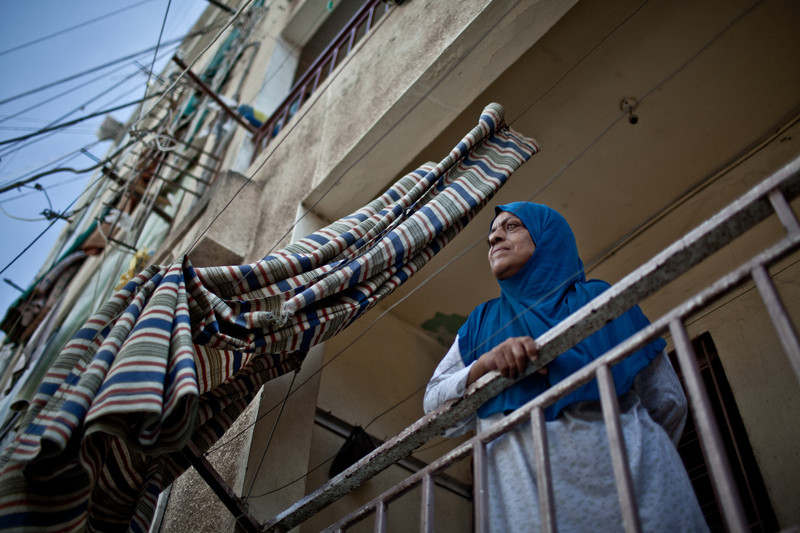
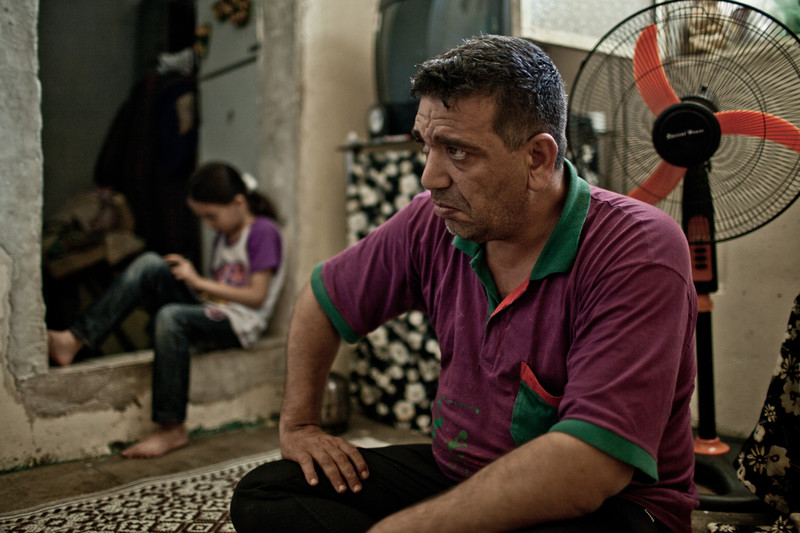
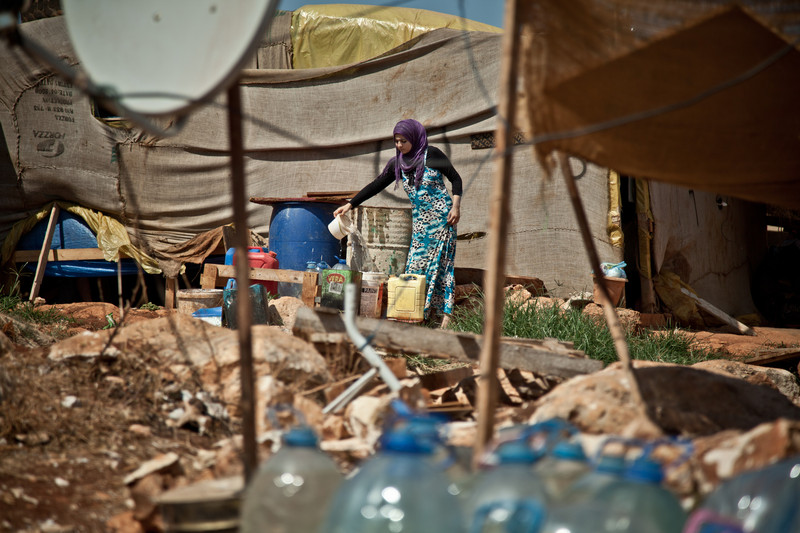
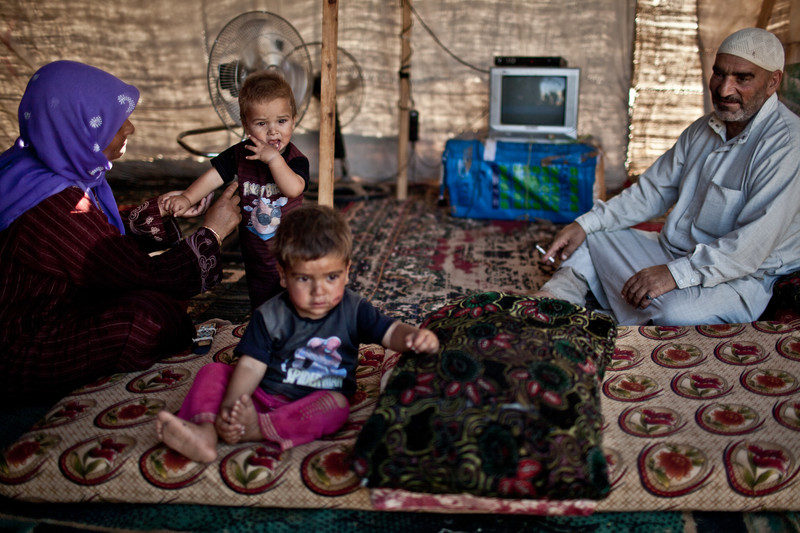
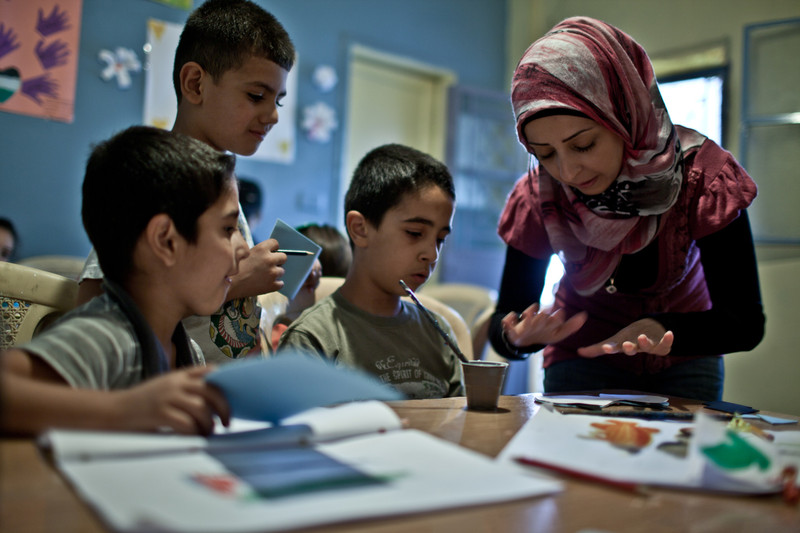
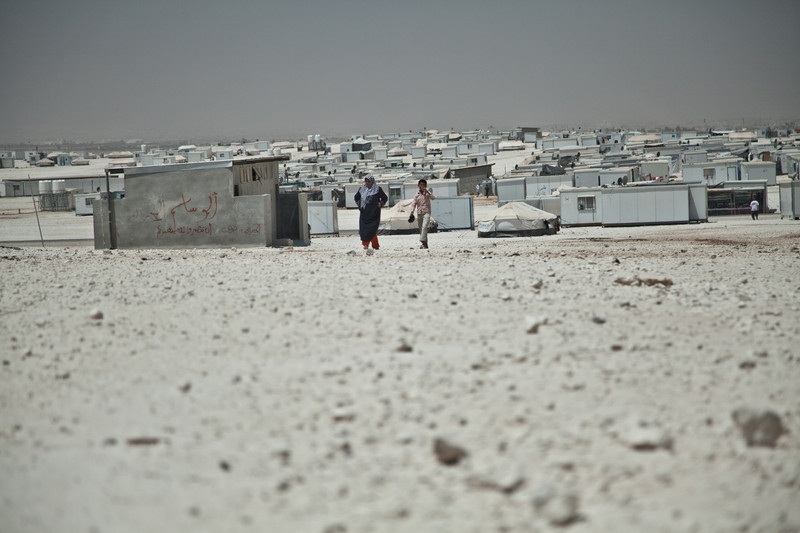
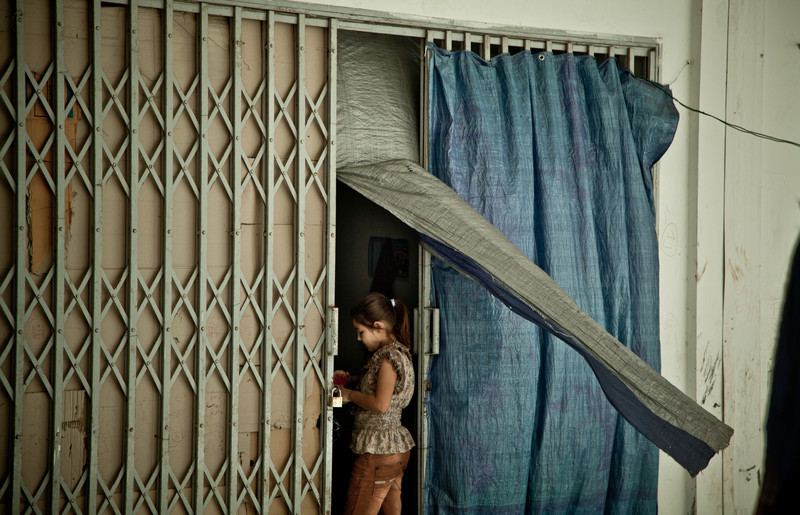
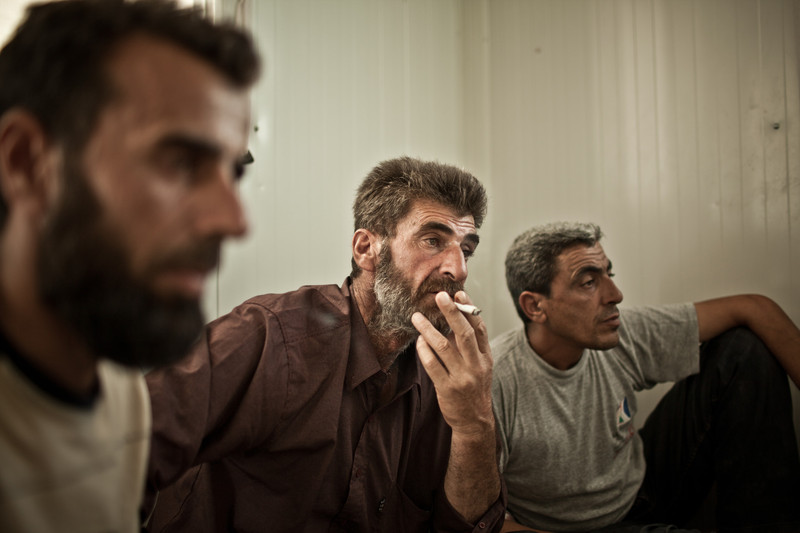
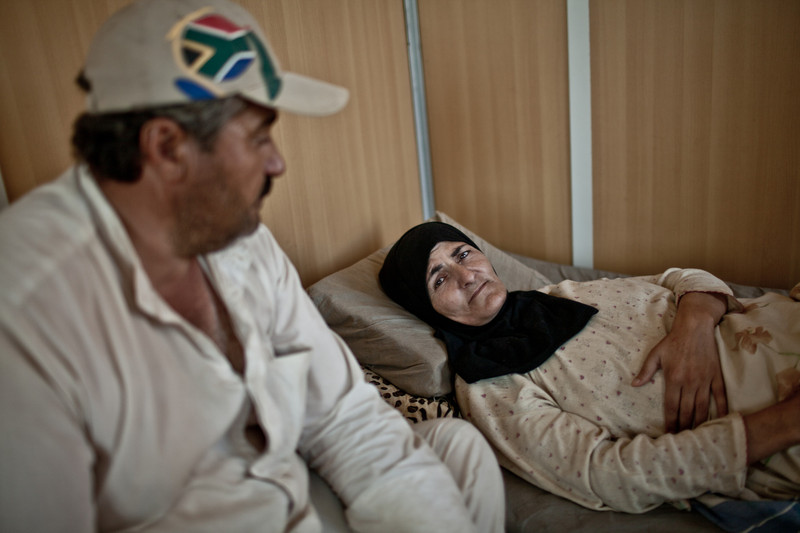
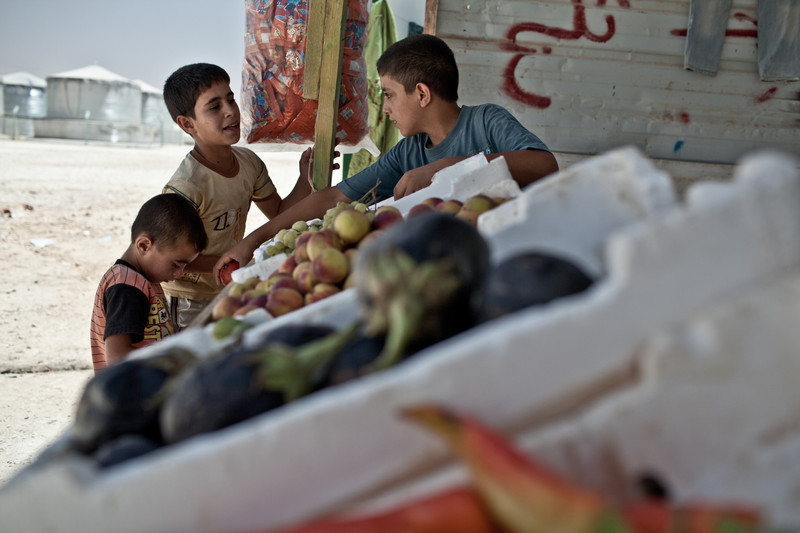
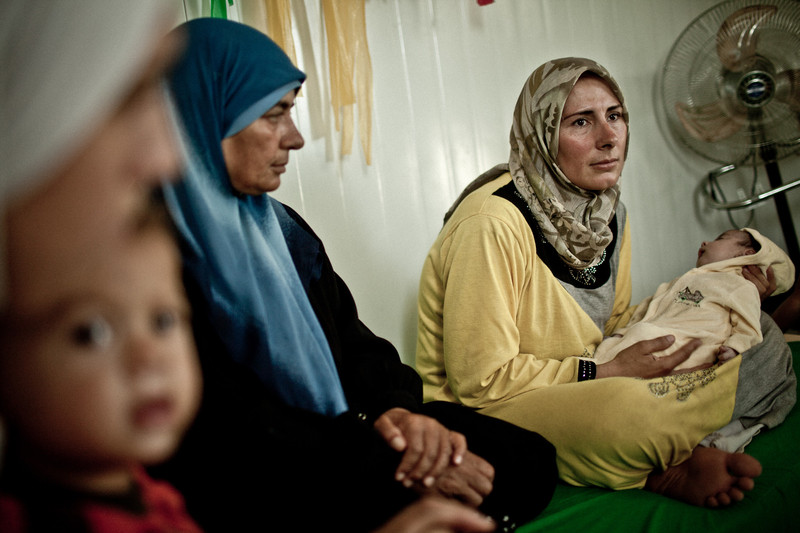
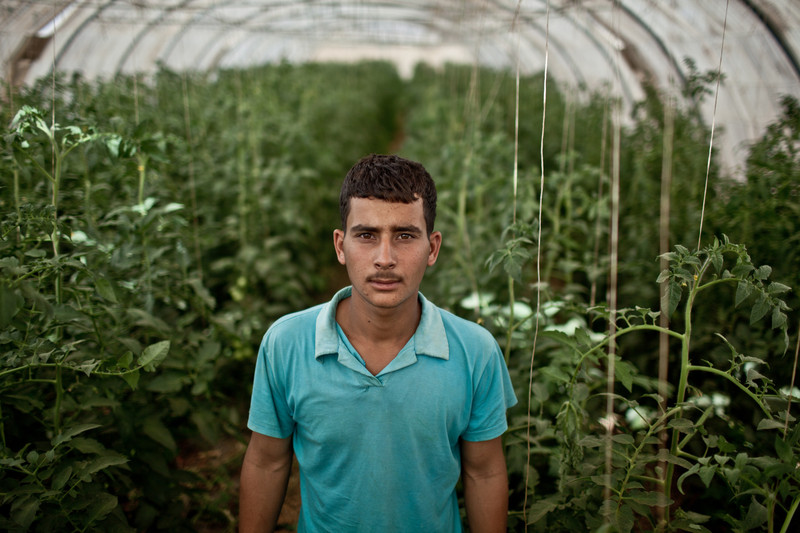
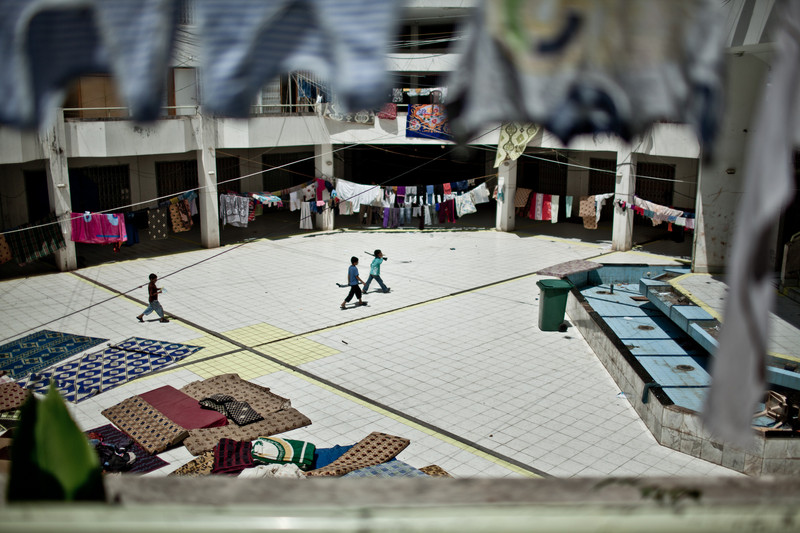
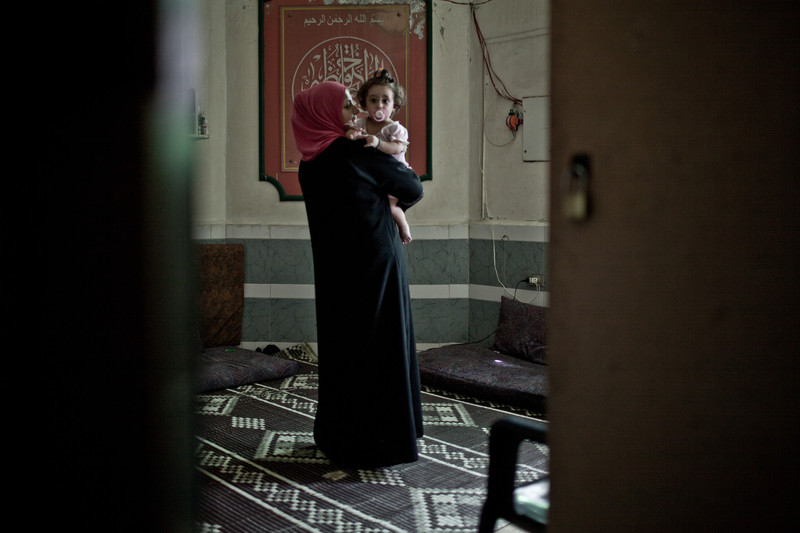
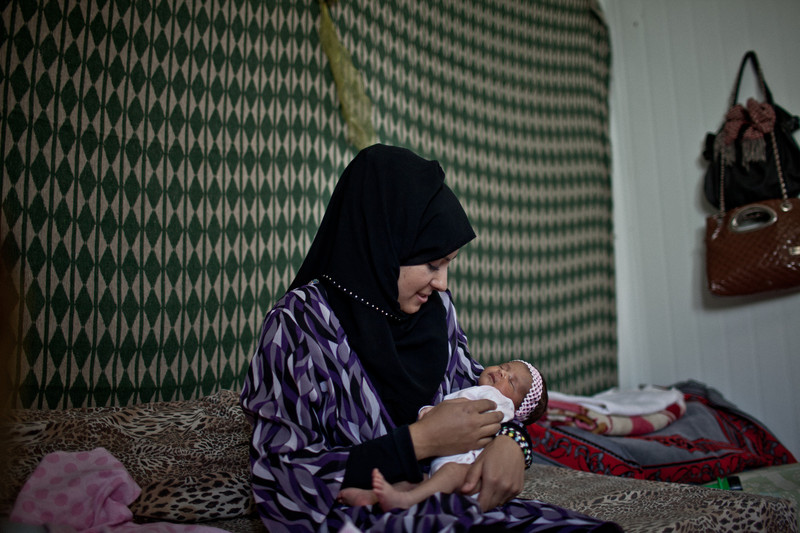
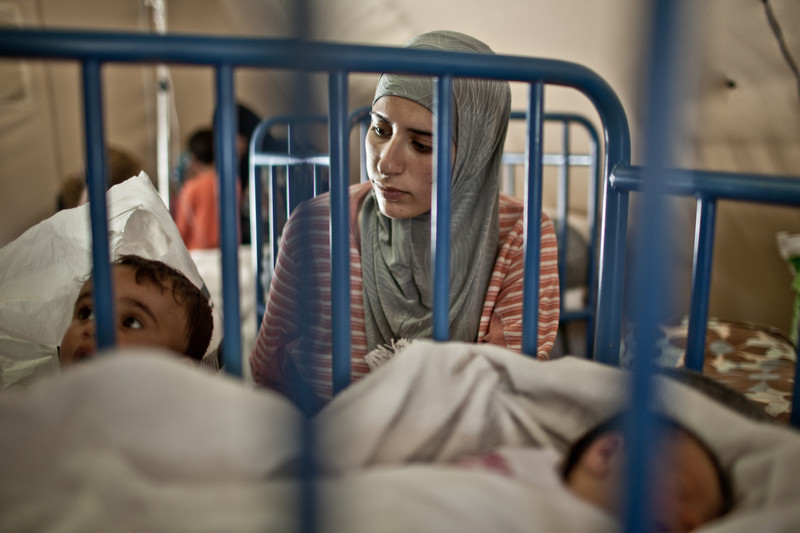
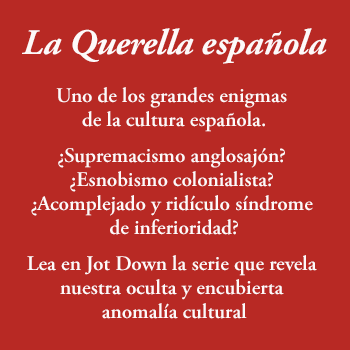








Pingback: ¿Siria? Ya no hay más Siria